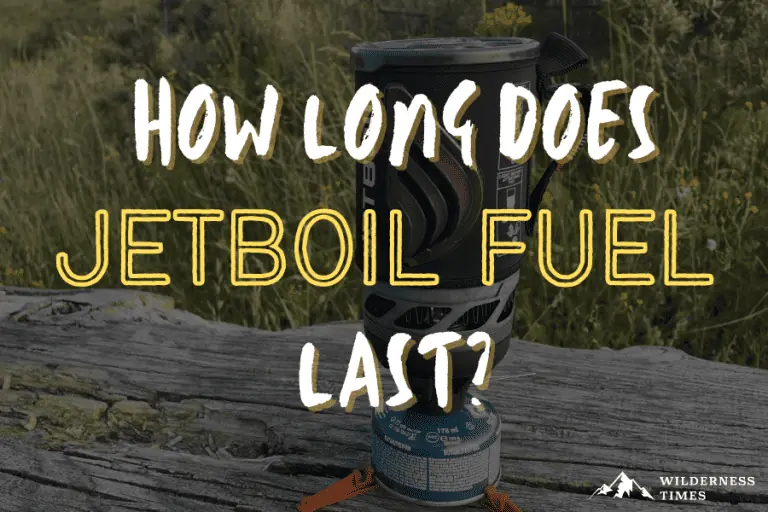Nothing makes us wish we had paid attention in math class like calculating the Jetboil fuel you’ll need for a campout.
Lucky for you, this article will give you a few tips and tricks for calculating your Jetboil fuel needs!
On average a standard 100g or 3.53 oz canister will last for about 45 minutes of continuous burn. You can expect even longer burn time for the bigger-sized canisters.
However, how long your fuel actually lasts on your trip will vary on how often you use your stove, how cold the environment is, and the altitude at which you’re using the fuel.
How Long Jetboil Fuel Lasts
On average a standard 100g or 3.53 oz canister will last for about 45 minutes of continuous burn. You can expect even longer burn time for the bigger-sized canisters.
For camping, 2.5 cups of water will generally be enough to hydrate one freeze-dried backpacking meal.
Here are some approximate burn times, meals made, and cups that can be boiled for each Jetboil canister size:
| Jetboil Canister Size | Approximate Cups (8oz) Boiled | Approximate Meals Made (2.5 cups each) | Continuous Burn Time |
| 100g / 3.53 oz | 40 | 10 – 14 | 45 minutes |
| 230g / 8.11 oz | 92 | 30 – 40 | 1.5 hours |
| 450g / 16 oz | 180 | 60 – 80 | 3 hours |
How Long Does A 100g/3.53 oz Canister Last?
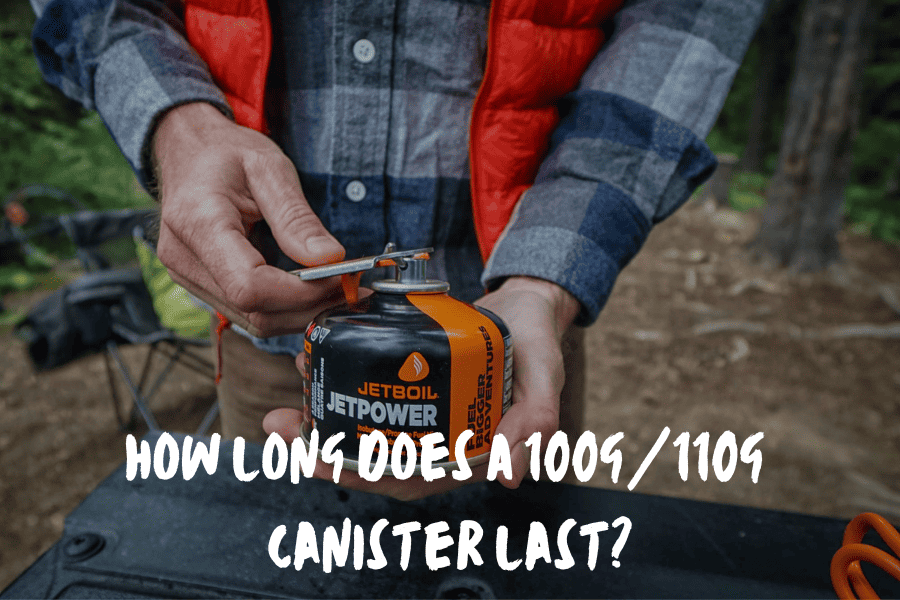
The 100g/3.53 oz gas canister size is one of the most common sizes you’ll see on the trail.
This fuel size will boil approximately 40 cups total.
However, it’s important to remember that most camping meals will require around 2.5 cups of boiling water.
So, cut that number in half when you’re on the trail and using the water for meals.
If you were to burn through your fuel in one continuous burn, a container of 100g/3.53 oz will last about 45 minutes.
We don’t recommend this for fuel conservation, though.
How Long Does A 230g/8.11 oz Canister Last?
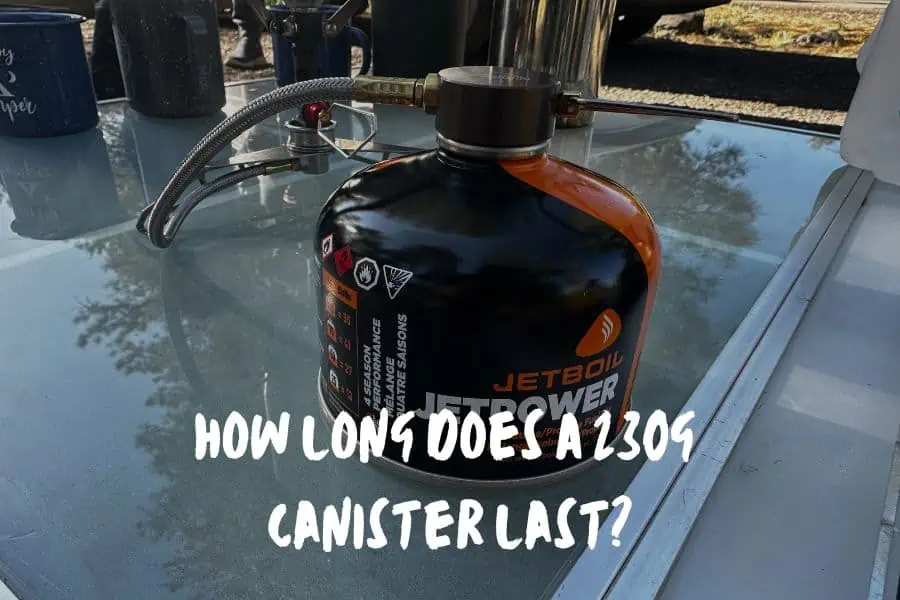
For calculation purposes, a 230g fuel canister is a little over double the amount in a 100/110g fuel canister.
Because of this, 230g will be able to boil about 92 cups of water.
This translates to anywhere from 30 to 40 meals on the trail and a continuous burn time of 1.5 hours.
How Long Does A 450g/16 oz Canister Last?
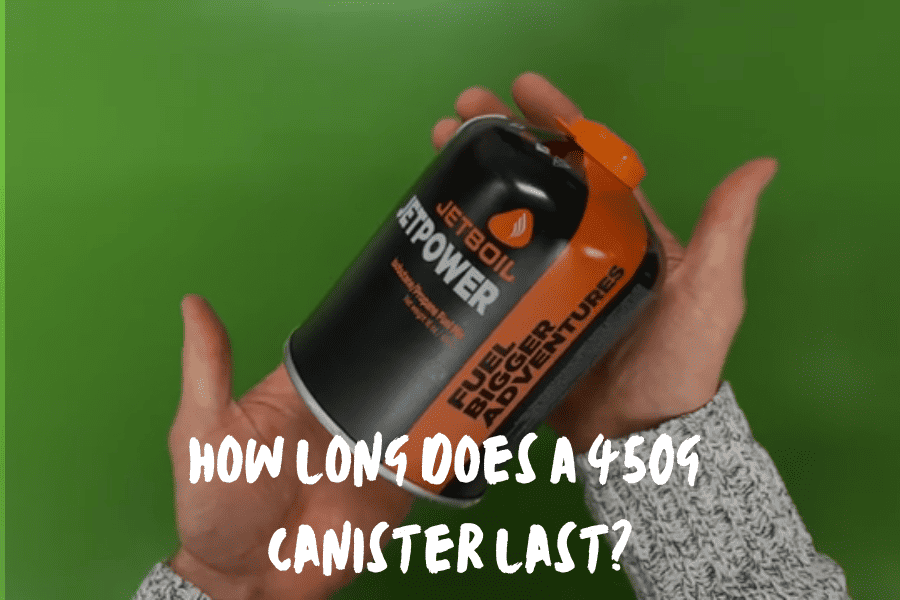
The largest fuel canister size we’re going to discuss in this article is the 450g size.
450g of fuel will be able to boil around 180 cups of water, translating to roughly 60 to 80 meals on the trail and around 3 hours of continuous burn time.
How Fast Does A Jetboil Boil?
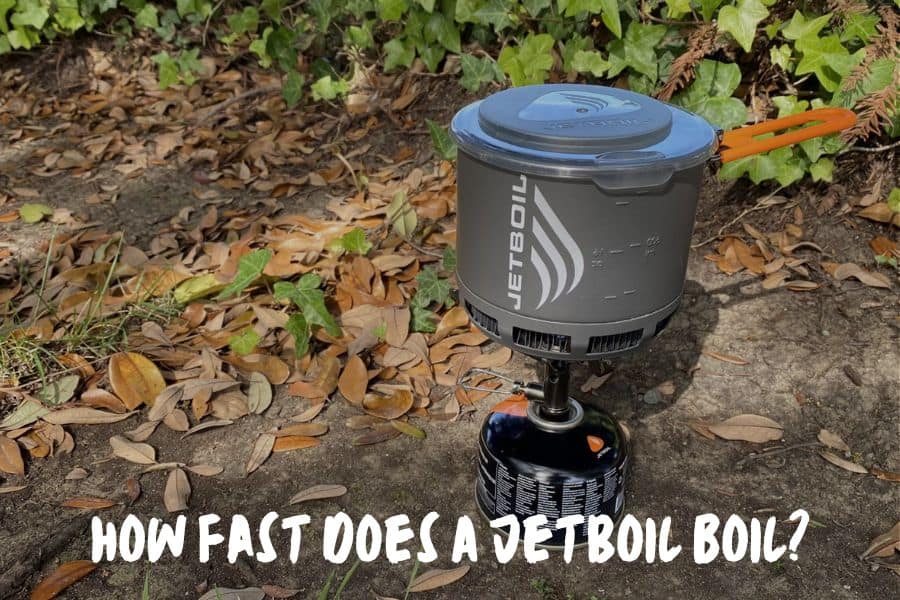
All Jetboil stoves should be able to bring water to a boil within a few minutes.
But if you’re looking for an even faster boiling time, you should look into Jetboil’s Flash Stove, which can boil water in 100 seconds!
You can check out Jetboil models and boil times here.
Factors That Affect Jetboil Fuel Consumption
Ambient Temperature & Environment
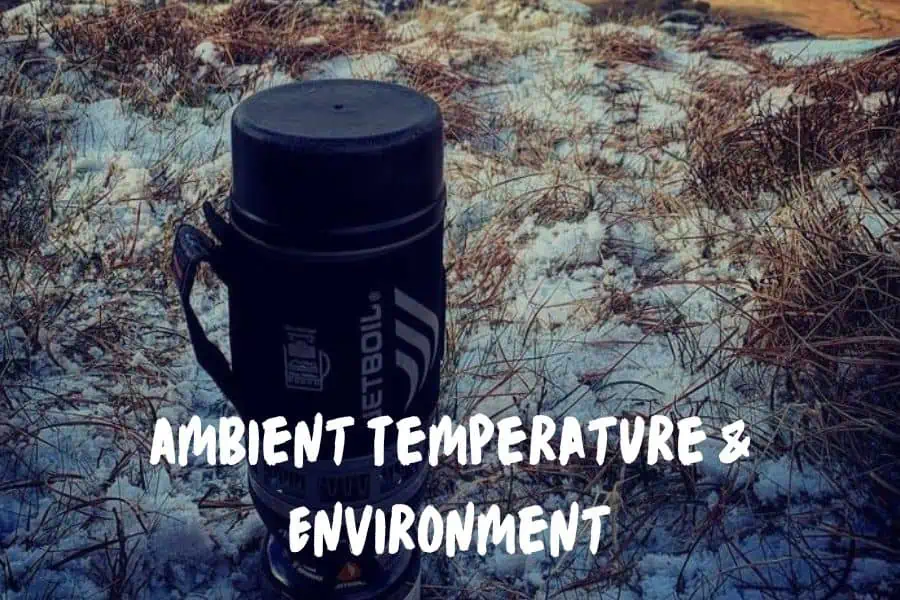
The colder the environment is around you while you’re using your stove, the more fuel your stove will use to heat up your food or water.
To boil water properly, the stove has to heat the water up from its original temperature to 212°F/100°C.
If the environment you’re in is colder (or windier) than normal, it’ll take the stove and fuel more energy to heat up the water to the proper temperature.
Therefore, when you’re in colder or windier environments, you may need to bring more fuel than expected.
It’s a good idea to cushion the difference in energy required to heat your food.
Altitude
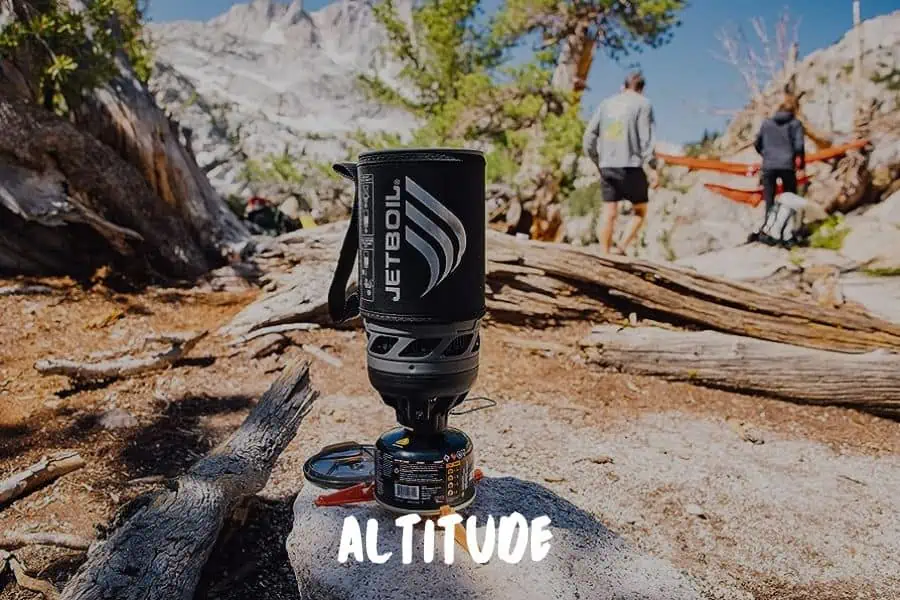
The lower atmospheric pressure in high elevations actually lowers the energy required to boil water.
This means that the higher you go in elevation, the less fuel you technically need.
However, unless you are experienced in high-altitude camping, I would not bring less fuel with you to account for this difference.
You may actually need the same amount of fuel you would need at lower elevations to account for the cold conditions. Sometimes, even more!
So, even though the thought of ditching some weight can be tempting, fight against it.
You do not want to be stuck in high elevation without enough fuel to heat up your food because you miscalculated how cold it would be.
Intensity Of Use
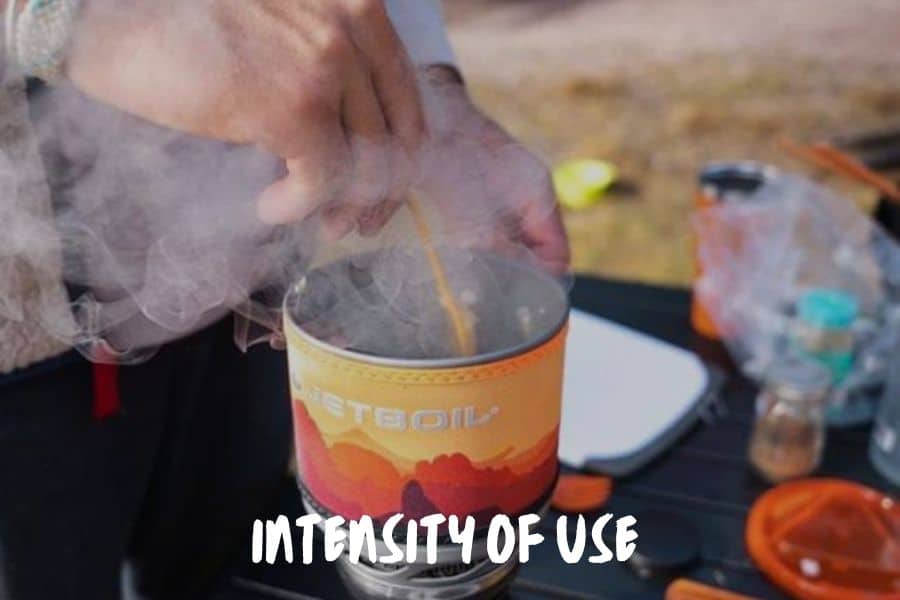
Even though it’s fairly straightforward, it’s definitely worth mentioning: the more you use your stove, the quicker you’ll use up your fuel.
If you want to bring less fuel with you on your campsite, consider limiting the amount of hot food you’ll eat on the trail.
You can limit yourself to one hot meal during dinner. Then, you could have cold breakfasts and lunches – food that doesn’t need to be cooked to eat – to conserve your fuel use on the trail.
In addition to limiting the amount of hot meals you eat in a day, the next section will review a few other strategies you can use to conserve fuel.
Tips To Conserve Fuel In Jetboil Systems
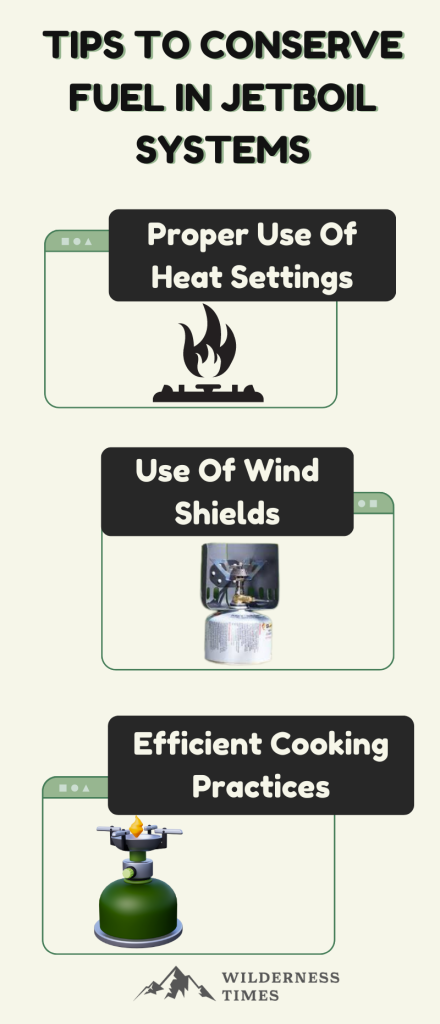
Proper Use Of Heat Settings
When using a Jetboil (or any camping stove) using the correct amount of heat can be quite the science.
In general, it’s best to use medium heat for most water or food, and increase or decrease heat from there.
Using too much heat while cooking can cause unnecessary fuel expenditure, and can even burn and waste your food if you’re not careful.
Use Of Wind Shields
Most stoves will come with a windshield or a piece of lightweight material around your stove to protect the flame and cookware from the wind.
Wind can have cooling effects, so it can lengthen the amount of time it takes to heat up your food.
This can cause you to use more fuel to properly heat up your water or food.
By protecting your materials from the wind, you’re making sure that your fuel is used more efficiently for the job at hand.
Efficient Cooking Practices
When you’re out on the trail you can conserve fuel by using efficient cooking practices.
For example, while you’re cooking, make sure all of your ingredients are prepped and ready before starting up your stove. Doing this will save burn time as you cook.
Additionally, you can conserve fuel by planning out or limiting the amount of times you’re having hot meals, or using your stove, on the trail.
On average, it’s normal for campers to heat up some water in the morning for coffee or tea, and then again at night to hydrate food.
The other meals eaten during the day can be “cold,” or not require cooking.
Adjusting this process as needed to use less fuel (and eat more cold foods as a result, or skip your morning cup) can be a great way to save on fuel.
FAQs
How Many Boils Can I Get From a Jetboil Fuel Canister?
If you count a single “boil” as heating two cups of water, you can get almost 20 boils (or 40 cups of water) out of a single 100g Jetboil fuel canister.
However, if the environment around the stove is cold or windy, you may need more fuel to heat up the same amount of liquid.
Does The Type Of Food Or Drink Affect Fuel Consumption?
Yes and no. The majority of the timing in this article is based on the heating of water because it’s the substance most likely to be heated on the trail.
If we’re getting scientific, some substances heat up slower or faster than water based on their chemical composition and overall mass.
However, it is unlikely you will be heating up anything that will have a significant difference in how much fuel they need to heat up.
How Does Jetboil Fuel Consumption Compare To Other Camping Stoves?
Jetboil stoves stand up well to other camping stove competitors. There are some brands that are more efficient or highly rated, but only just slightly so.
In general, any type of compact camping stove will have similar performance to a Jetboil – and be fairly efficient.
These backpacking stoves are built for efficiency, and their performance reflects this.
However, larger stoves like Coleman camper stoves are not nearly as efficient in fuel use but are great at cooking multiple pots or pans at once.
Can I Use Other Brands Of Fuel With My Jetboil Stove?
Yes! As long as the fuel canister has an EN417 opening, it’s compatible with the Jetboil stove and you can use it.
It’s absolutely imperative any canister you’re using with a Jetboil has an EN417 type fuel canister opening.
This means that the canister will be able to safely and securely attach to the stove. If you get a canister that doesn’t have this opening, it can cause a gas leak and result in potential harm to you and those around you.
What Should I Do If I Run Out Of Fuel While Camping?
If you run out of fuel while you’re on the trail and you’re in an area that permits the use of fire, you can build a fire to heat up your food and water.
However, it’s always important to check the local fire regulations to make fires are allowed in the area.
If you’re out of fuel and fires are not permitted in the area, it’s best to rely on your “cold meals”.
Conclusion
Figuring out how much fuel you need to bring on your campout can be tricky!
I hope this article helps you the next time you’re calculating exactly how many canisters you need to bring on your next outdoor adventure.


